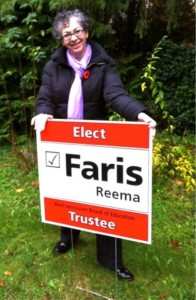Posts Tagged ‘priority’
Why Women’s Rights Are An Education Priority
Here are some numbers I came across while preparing for an upcoming presentation:
- Women constitute 53% of the world’s population and own 1% of the wealth
- Women still earn 20% less than men
- In Canada, women occupy only 11% of the seats on corporate boards
- Of the 308 parliamentary seats in Canada’s House of Commons, only 68 (22%) are filled by women
- According to the New York-based Women’s Media Centre, only 3% of media decision makers are women
- In the 2010 Report on the Global Gender Gap issued by the World Economic Forum, which assesses criteria such as employment equity, health care, and political representation, Canada ranked #20 — a free-fall from #7 in 2005 — putting our country behind the US for the first time ever in terms of its treatment of the female population.
What does this all mean?
I think it means that even in our developed Western world, where gender inequalities are not as apparent as they may be elsewhere, there’s a lot of work to do in sustaining women’s rights and in working towards a better, more just society. There are worrying indications and further support to be found for this need in articles such as this one from The Globe & Mail on the reduction in the number of women appointed to the judiciary.
My focus here is not to talk about the broader social policy issues — at least not today — but I would like to address what I think this may mean in terms of educating young men and women, boys and girls.
Let’s look at what some consider the three levers of our modern society — money, politics, and the media — and some subject areas or topics which could be incorporated into or emphasized in the curriculum.
Money
On the premise that the more you understand money and how it works, the better you’ll manage your own financial situation. Are we teaching enough about:
- financial literacy and budgeting?
- economics and the history of financial economics?
- how to contend with the lure of consumerism?
Unless you learn why politics is important, how our system works, and its history, you’ll never see or understand the relevance to you and the world you live in.
- Why aren’t K-12 students exploring elections as they happen? In our community, students from Capilano University helped to run the All Candidates Meeting hosted by the West Vancouver Chamber of Commerce (Trustees were not included in the official proceedings). However, as far as I know, none of the municipal candidates were invited into schools to talk to students or to answer questions. If our intent is to improve the engagement of youth in the electoral process, why not take advantage of real life situations when they are current and relevant?
- Is the history of the struggle for women’s rights highlighted when Canadian history is being taught?
- Are biographies or autobiographies of Canadian women included on reading lists for social studies courses or even as examples of non-fiction in English or French language classes?
Media
It surrounds us, it influences us, it continually evolves and changes. In a recent CBC documentary, Naomi Wolf, author of The Beauty Myth, says she finds media images of women getting worse, reinforcing unrealistic expectations and norms. Are we doing enough to educate students about the media — advertising, movies, music videos, song lyrics, newscasts, etc. — and the influence it has on our behaviours and attitudes? Did you know that misogynist comments on-line are starting to drive female journalists and bloggers off-line according to a recent article in the UK newspaper, The Guardian. Women’s voices need to be heard and represented, not shrouded in the silence of earlier eras that would negate the work of great Canadians such as Henrietta Muir Edwards, Nellie McClung, Louise McKinney, Emily Murphy, and Irene Parlby. https://archives.cbc.ca/on_this_day/10/18/
There are many other ideas and initiatives we could pursue and explore. Paying attention to these three areas would be a start because the issue of women’s rights is an issue of human rights — not just abroad, but here at home.
The Arts In Education – For A Better World
What a relief! Mark Mercer’s article in this morning’s newspaper reiterated that “universities are about education, about learning for the sake of learning” and that “university done rightly is great preparation for life”.
This was a welcome contrast to Margaret Wente’s recent diatribe against the Occupy protesters. With a swipe of her pen, she denigrates the value of the humanities. She seemingly fails to recognize that there are likely as many mechanical engineers out of work today as there are sociology students trying to find their way in life.
The business challenges we face and the deficiency in employment opportunities for young adults is not due to the educations they pursue; rather it reflects the reality of the structural weaknesses and flaws in our economies and societies.
And while we struggle to address these serious questions, as educators we need to ensure that we don’t lose sight of the value of the humanities in education and the value of the arts in our students lives.
 When I walk down the hallways at my son’s school, I’m always struck by the amazing artwork the students produce: artwork directly related to the curriculum, the topics they are studying, and their learning. A lot does get done and I think that a lot more needs to be done to without imposing a further burden of delivery on teachers.
When I walk down the hallways at my son’s school, I’m always struck by the amazing artwork the students produce: artwork directly related to the curriculum, the topics they are studying, and their learning. A lot does get done and I think that a lot more needs to be done to without imposing a further burden of delivery on teachers.
What if in-residence programs were implemented? For example, what if a published author served as writer-in-residence for the district? We have great visual artists on the North Shore — why can’t we look at having them conduct classes or organize field trips to their home studios throughout the year? Why can’t a professional dancer come in on an extended basis, once a week, to help choreograph a holiday show? Could we organize visits to Sinfonia’s (the North Shore’s professional orchestra) rehearsals? Why isn’t it automatically on the calendar every September and October for classes to take in sessions offered during the Vancouver International Writers Festival or Vancouver International Film Festival?
Some schools may be pursuing these sorts of projects and some schools aren’t. These type of initiatives, in my mind, would compliment teachers’ efforts and would be most viable in conjunction with greater support for specialist teachers (music, art, drama, dance, etc.) already hard at work. I also see that such programs would be most economically effective if delivered on a resource-sharing model between the district, the schools, and the Parent Advisory Councils (PACs).
I’m not advocating a specific approach or model because I don’t have all the information necessary to say which one will work the best. What I do know is that there is room to do more, much more. And we must do more because the arts, to me, are integral to the human experience and our children’s learning will be enhanced if art is more fully-integrated in their daily routines as a central component rather than as simply an adjunct.
I agree with Martha C. Nussbaum who writes in her 2010 book Not For Profit – Why Democracy Needs the Humanities:
“If we do not insist on the crucial importance of the humanities and the arts, they will drop away, because they do not make money. They only do what is much more precious than that, make a world that is worth living in, people who are able to see other human beings as full people, with thoughts and feelings of their own that deserve respect and empathy, and nations that are able to overcome fear and suspicion in favor of sympathetic and reasoned debate.”
I think there’s room to dispute her contention that the arts do not make money (look at this recent article by John Doyle on the profits made by private television broadcasters), but the point is that there is inherent value in the arts and humanities which we risk losing in a world solely focused on measurable utility and on money.
And isn’t that the ultimate purpose of education, as Nussbaum says, to “make a world that is worth living in, people who are able to see other human beings as full people”?
So let’s do that. Let’s make sure that our curricula do not sacrifice the arts. Let’s not make this a lesser world, but a better one.
